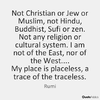The BrOkEn HeArT
BANNED

- Joined
- Mar 17, 2015
- Messages
- 3,052
- Reaction score
- -63
- Country
- Location
Hi All,
First I want to make clear that this thread is not on religious topic, nor about any religion.
I'm talking about spirituality here.
I have been met and had conversation with many religious people around the world. And I was surprised that many of them even don't know the meaning of spiritualism. They connects spiritualism with religion.
But here I tell you that spiritualism is different from religions.
What is spiritualism??
Spiritualism is the scientific way to connect with The Almighty God. Its all about searching and finding the truth. This is not about blind beliefs. Its all about finding your own light.
Mostly religious people think that there are only two types people living in this world. One is religious and other is atheists.
But they don't know there is a middle way existed between religion and atheism. That's is spiritualism.
Spiritualism never praise or criticize anything. Its all about your individual connection with the Almighty .
Once a person becomes spiritual , will be no longer religious.
And if a person is no longer religious , he/she can't be hated by anyone on the name of religion. So spiritualism is the only way to bring peace in this world.
Only then nobody will find a reason to hate you or kill you.
Here I'm posting some spiritual quotes from some of great spiritual personalities. :-














First I want to make clear that this thread is not on religious topic, nor about any religion.
I'm talking about spirituality here.
I have been met and had conversation with many religious people around the world. And I was surprised that many of them even don't know the meaning of spiritualism. They connects spiritualism with religion.
But here I tell you that spiritualism is different from religions.
What is spiritualism??
Spiritualism is the scientific way to connect with The Almighty God. Its all about searching and finding the truth. This is not about blind beliefs. Its all about finding your own light.
Mostly religious people think that there are only two types people living in this world. One is religious and other is atheists.
But they don't know there is a middle way existed between religion and atheism. That's is spiritualism.
Spiritualism never praise or criticize anything. Its all about your individual connection with the Almighty .
Once a person becomes spiritual , will be no longer religious.
And if a person is no longer religious , he/she can't be hated by anyone on the name of religion. So spiritualism is the only way to bring peace in this world.
Only then nobody will find a reason to hate you or kill you.
Here I'm posting some spiritual quotes from some of great spiritual personalities. :-










